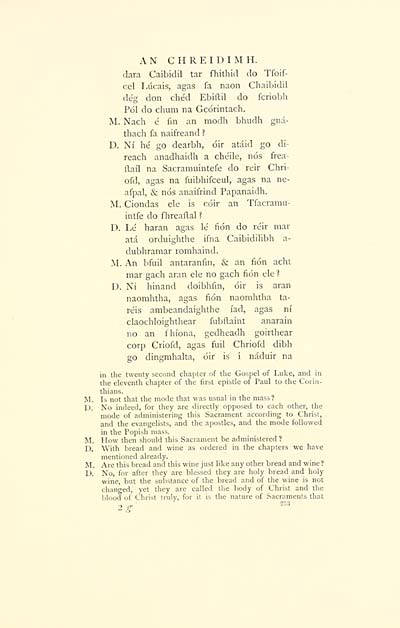Download files
Complete book:
Individual page:
Thumbnail gallery: Grid view | List view

AN CHREIDI M H.
dara Caibidil tar fhithid do Tfoif-
cel I.ucais, agas fa naon Cliaibidil
cleg don ched Ebiflil do fcriobh
Pol do chum na Gcorintach.
M. Nach e fin an modh bhudh gna-
thach fa naifreand?
D. Nf he go dearbh, oir ataid go di-
reach anadhaidh a che'ile, nds frea-
ftail na Sacramuintefe do reir Chri-
ofd, agas na fuibhifceul, agas na ne-
afpal, & nds anaifrind Papanaidh.
M. Ciondas ele is coir an Tfacramu-
intfe do f hreaftal Ì
D. Le haran agas le' fion do reir mar
ata orduighthe ifna Caibidilibh a-
dubhramar romhaind.
M. An bfuil antaranfin, & an fion acht
mar gach aran ele no gach fion ele 1
D. Ni hinand doibhfin, oir is aran
naomhtha, agas fion naomhtha ta-
reis ambeandaighthe iad, agas ni
claochloighthear fubflaint anarain
no an fhiona, gedheadh goirthear
corp Criofd, agas fuil Chriofd dibh
go dingmhalta, oir is i naduir na
in the twenty second chapter of the Gospel of Luke, and in
the eleventh chapter of the first epistle of Paul to the Corin-
thians.
M. Is not that the mode that was usual in the mass?
D. No indeed, for they are directly opposed to each other, the
mode of administering this Sacrament according to Christ,
and the evangelists, and the apostles, and the mode followed
in the Popish mass.
M. How then should this Sacrament be administered ?
IX With bread and wine as ordered in the chapters we have
mentioned already.
M. Are this bread and this wine just like any other bread and wine?
D. No, for after they are blessed they are holy bread and holy
wine, but the substance of the bread and of the wine is not
changed, yet they are called the body of Christ and the
blood of Christ truly, for it is the nature of Sacraments that
2^'
dara Caibidil tar fhithid do Tfoif-
cel I.ucais, agas fa naon Cliaibidil
cleg don ched Ebiflil do fcriobh
Pol do chum na Gcorintach.
M. Nach e fin an modh bhudh gna-
thach fa naifreand?
D. Nf he go dearbh, oir ataid go di-
reach anadhaidh a che'ile, nds frea-
ftail na Sacramuintefe do reir Chri-
ofd, agas na fuibhifceul, agas na ne-
afpal, & nds anaifrind Papanaidh.
M. Ciondas ele is coir an Tfacramu-
intfe do f hreaftal Ì
D. Le haran agas le' fion do reir mar
ata orduighthe ifna Caibidilibh a-
dubhramar romhaind.
M. An bfuil antaranfin, & an fion acht
mar gach aran ele no gach fion ele 1
D. Ni hinand doibhfin, oir is aran
naomhtha, agas fion naomhtha ta-
reis ambeandaighthe iad, agas ni
claochloighthear fubflaint anarain
no an fhiona, gedheadh goirthear
corp Criofd, agas fuil Chriofd dibh
go dingmhalta, oir is i naduir na
in the twenty second chapter of the Gospel of Luke, and in
the eleventh chapter of the first epistle of Paul to the Corin-
thians.
M. Is not that the mode that was usual in the mass?
D. No indeed, for they are directly opposed to each other, the
mode of administering this Sacrament according to Christ,
and the evangelists, and the apostles, and the mode followed
in the Popish mass.
M. How then should this Sacrament be administered ?
IX With bread and wine as ordered in the chapters we have
mentioned already.
M. Are this bread and this wine just like any other bread and wine?
D. No, for after they are blessed they are holy bread and holy
wine, but the substance of the bread and of the wine is not
changed, yet they are called the body of Christ and the
blood of Christ truly, for it is the nature of Sacraments that
2^'
Set display mode to: Large image | Transcription
Images and transcriptions on this page, including medium image downloads, may be used under the Creative Commons Attribution 4.0 International Licence unless otherwise stated. ![]()
| Early Gaelic Book Collections > Blair Collection > Book of Common Order, commonly called John Knox's Liturgy > (269) |
|---|
| Permanent URL | https://digital.nls.uk/76255777 |
|---|
| Description | A selection of books from a collection of more than 500 titles, mostly on religious and literary topics. Also includes some material dealing with other Celtic languages and societies. Collection created towards the end of the 19th century by Lady Evelyn Stewart Murray. |
|---|
| Description | Selected items from five 'Special and Named Printed Collections'. Includes books in Gaelic and other Celtic languages, works about the Gaels, their languages, literature, culture and history. |
|---|

